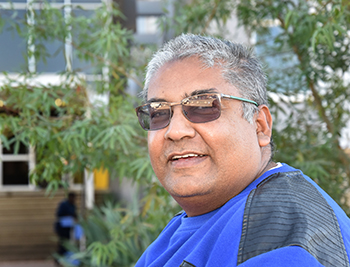Latest News Archive
Please select Category, Year, and then Month to display items
11 February 2022
|
Story Leonie Bolleurs and Rulanzen Martin
![]()

After two years of lockdown, online meetings, and limited contact with colleagues, academy at the University of the Free State (UFS) is gradually returning to normal. This month (February 2022), staff, students, and members of related industries will convene on three different occasions to learn about cutting-edge scholarship, to reconnect with each other, and to discuss issues impacting society in the fields of theology, the humanities, and agriculture.
Seminar on ‘The Limits of Decolonisation’ with Prof RW Johnson
Date: 24 February 2022
Time: 09:00-16:00 SAST
Venue/Platform: Equitas Auditorium, UFS Bloemfontein Campus, and Microsoft Teams
Decolonisation has been a heated point of discussion for some time now, but have you ever wondered if there could be limitations hindering the decolonisation project? The Departments of Political Studies and Governance and Philosophy and Classics at the UFS will host an array of academics and experts for a hybrid seminar on the topic The Limits of Decolonisation.
If decolonisation is an important issue for you or if you are interested in the topic and its relevance and influence in the world and academia, you should join or attend the seminar – either online via Microsoft Teams or in person in the Equitas Auditorium – on 24 February 2022 from 09:00.
The keynote speaker is political scientist
Prof RW Johnson from the University of Oxford. Prof Johnson is an emeritus fellow at Magdalen College and is the author of several acclaimed political books. The other speakers are all from the Departments of Political Studies and Governance, and Philosophy and Classics. Terrence Corrigan from the
South African Institute of Race Relations will speak on The relationship between critical race theory and decolonisation.
RSVP: Alice Stander StanderAFM@ufs.ac.za (please specify dietary requirements, as a light lunch will be served)

Prof Solomon appointed to board of flagship journal of UNECA
2016-10-06

Prof Hussein Solomon, member of the Editorial
Board of the Afro-Arab Social and Economic
Review. He is also the author of Islamic State
and the Coming Global Confrontation.
Photo: Charl Devenish
“I cannot say I worked towards it – I just did my work, and I guess someone noticed.” These are the words of Prof Hussein Solomon from the Department of Political Studies and Governance at the University of the Free State (UFS), who was recently appointed to the Editorial Board of the Afro-Arab Social and Economic Review.
On an editorial board with people he quoted
This is the flagship journal of the United Nations Economic Commission for Africa (UNECA). The mandate of the Economic Commission for Africa (ECA) is to promote the economic and social development of the states which are regarded as members of the United Nations (UN). Prof Solomon says the board consists of people that he used to quote when he was a student, and to serve alongside them is a privilege.
Book launched in Greece, Japan, and Indonesia
His book, Islamic State and the Coming Global Confrontation, was earlier published by Palgrave Macmillan in London and launched in Greece, Japan, and Indonesia in June and July 2016 respectively. It analyses the origins and organisational structure of the Islamic State (IS), ans examines its military triumphs and success in securing new recruits via social media.
Exploit of IS vulnerabilities to combat organisation
Prof Solomon says the IS makes use of the winning hearts and mind (WHAM) principle where they earn the trust of residents by providing basic services, and the only solution we have is to “exploit the Islamic State’s vulnerabilities and to highlight their atrocities.”
He mentions that a lot needs to be done to overcome the IS. It is vital to have boots on the ground and an acceptance that countries will splinter. An overarching strategy needs to be in place which allows for regional variations, good governance, and the countering of extremism.